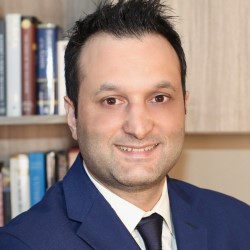
Leonidas Palaiodimos MD, MS, FACP
Academic Hospitalist and Director of Clinical Research, Division of Hospital Medicine, Jacobi Medical Center, NYC Health + Hospitals
Assistant Professor of Medicine at the Albert Einstein College of Medicine, Bronx, NY
— MEDICAL SCHOOL —
School of Medicine of the Aristotle University of Thessaloniki in Greece
— INTERNAL MEDICINE RESIDENCY —
Jacobi Medical Center, NYC Health + Hospitals, Bronx, NY
What is your current position?
I work as an academic hospitalist and Director of Clinical Research for the Division of Hospital Medicine at Jacobi Medical Center (NYC H+H) and Assistant Professor of Medicine at the Albert Einstein College of Medicine, Bronx, NY.
Where did you attend medical school and postgrad training?
I attended the School of Medicine of the Aristotle University of Thessaloniki in Greece, and completed my internal medicine residency training at Jacobi Medical Center.
Why did you choose to become a physician?
In the community I grew up in, as in many other societies, it was expected of high-performing students to become doctors, lawyers, or engineers. My parents never exerted overt pressure on me, but deep down I knew that they would be proud if I followed one of those career pathways. In retrospect, I now realize that the decision to study medicine in particular was based on my inclination to help people when they need it most.
What field of internal medicine did you select and why?
I selected hospital medicine as the focal point of my practice. I like the acuity of inpatient medicine, making complex decisions at a quick pace, and the multisystem nature of this specialty. Sometimes I miss the personal touch of outpatient medicine and the opportunities for developing long-term therapeutic relationships. As a result, I became certified in obesity medicine in the hope that I may dedicate some of my time to patient care in the outpatient setting.
Please describe a typical day in your practice.
My day starts early in the morning by responding to e-mails, reviewing patient charts, and making preliminary preround plans. We start teaching rounds at 9 a.m. when we see our patients at the bedside. In the afternoon, I do family meetings and bedside procedures, write notes, discuss the most complicated patient cases with consultants when appropriate, meet with residents and students to discuss their progress, and tackle administrative responsibilities.
What are some of your special interests professionally?
My professional interests are wide ranging, which is what drew me to practice internal medicine in the first place. More specifically, obesity, pulmonary embolism and anticoagulation, point-of-care ultrasound, bedside procedures, and clinical medical education are my main interests.
What are your interests and hobbies outside of medicine?
My wife and I love watching our 19-month-old son discovering the world. I enjoy reading books on history and geopolitics. Sunday coffee with my friends is a nonnegotiable part of my routine. I travel to Greece frequently as well.
What advice would you like to share with medical students, or what do you wish someone would have told you while you were in medical school?
"I do not know" is an acceptable answer. We should not hesitate to ask for help when we need it. Our goal should be to become incrementally better day by day.
If you could change one thing about yourself, what would it be?
There are times that I get upset when I encounter behaviors that I consider unprofessional or unreasonable. I am trying to learn to adjust my reaction from becoming upset to a more proactively constructive approach in these situations.
What do you consider your greatest achievement?
The period between 2009 and 2013 was a dark period in my life with regard to mental health. I witnessed the suffering—and eventually the death—of my mother and experienced job dissatisfaction and disappointment as well as financial issues. I am proud that I managed to get through that tough period through patience, persistence, and faith that the future would be better.
What is your most treasured possession?
The Cross necklace given to me by my father when I immigrated to the United States is my most important possession. I have never removed it from my neck since then. Metaphorically, my wife and son, my family, and all the friends and mentees I have had throughout the years are my most treasured possessions by far.
What is your motto?
Tomorrow is another day.
Back to the February 2024 issue of ACP IMpact
More I.M. Internal Medicine Profiles

